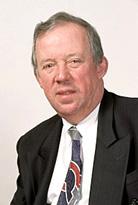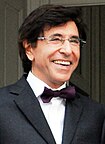
Guy Maurice Marie Louise Verhofstadt is a Belgian politician who has served as the Leader of the Alliance of Liberals and Democrats for Europe and a Member of the European Parliament (MEP) from Belgium since 2009. He served as the 47th Prime Minister of Belgium from 1999 to 2008, Deputy Prime Minister of Belgium from 1985 to 1992 and Minister of Budget from 1985 to 1992. He was a Member of the Chamber of Representatives from 1985 to 2009.

Open Flemish Liberals and Democrats, commonly known as Open VLD or simply as the VLD, is a conservative-liberal Flemish political party in Belgium. The party was created in 1992 from the former Party for Freedom and Progress (PVV) and politicians from other parties. The party led the government for three cabinets under Guy Verhofstadt from 1999 until March 2008. Open VLD most recently formed the Federal Government with N-VA, CD&V and the Francophone Reformist Movement (MR).

Belgium is a federal state with a multi-party political system, with numerous parties who factually have no chance of gaining power alone, and therefore must work with each other to form coalition governments.

Vivant is a small Belgian social liberal political party in Belgium founded by millionaire Roland Duchâtelet. In the regional elections in June 2004, the party formed a strategic alliance with the Flemish Liberals and Democrats (VLD). Both parties are founded on the principle of individualism and can be called liberal. In 2007, the party announced it would likely merge with the VLD.
Regional elections were held in Belgium, to choose representatives in the regional councils of Flanders, Wallonia, Brussels and the German-speaking Community on 13 June 1999. The regional elections were held on the same day as the European elections and the federal elections.
This article gives an overview of liberalism in Belgium. It is limited to liberal parties with substantial support, mainly proved by having had a representation in parliament. The sign ⇒ denotes another party in that scheme. For inclusion in this scheme it is not necessary that parties labeled themselves as a liberal party.

Hugo F.V. Coveliers is a retired Belgian politician and lawyer. He was a member of the Belgian Chamber of People's Representatives between 1985 and 1995 and from 1993 to 2003. Since 2003 he has been a member of the Belgian Senate. He was a parliamentary chairman for the VLD in both chambers, from 1999 to 2003.

Flemish political parties operate in the whole Flemish Community, which covers the unilingual Flemish Region and the bilingual Brussels-Capital Region. In the latter, they compete with French-speaking parties that all also operate in Wallonia. There are very few parties that operate on a national level in Belgium. Flanders generally tends to vote for right-wing, conservative parties, whereas in French-speaking Belgium the socialist party is usually the most successful one.

Eduard Marie August "Ward" Beysen was a Belgian politician and well-known freemason. He held a degree in Dutch and history teaching, obtained in 1963 in Lier and started his political career in the seventies in the Flemish liberal party, the Party for Freedom and Progress (PVV), which was renamed Flemish Liberals and Democrats (VLD) in 1992. Ward Beysen - suffering a depression - died by drowning himself in the lake of Fort 6 in the south of Antwerp.

The Federal Government of Belgium exercises executive power in the Kingdom of Belgium. It consists of ministers and secretaries of state drawn from the political parties which form the governing coalition. The federal government is led by the Prime Minister of Belgium, and Ministers lead ministries of the government. Ministers together form the Council of Ministers, which is the supreme executive organ of the Government.

The 2007 Belgian federal election took place on Sunday 10 June 2007. Voters went to the polls in order to elect new members for the Chamber of Representatives and Senate.

Libertarian, Direct, Democratic is a conservative-liberal, libertarian, and right-wing populist Flemish political party in Belgium.
Purple is a common term in politics for governments or other political entities consisting of parties that have red and blue as their political colours. It is of particular note in two areas: in the politics of the Netherlands and Belgium and in the politics of the United States.

Elections for the Federal Parliament were held in Belgium on 13 June 2010, during the midst of the 2007-11 Belgian political crisis. After the fall of the previous Leterme II Government over the withdrawal of Open Flemish Liberals and Democrats from the government the King dissolved the legislature and called new elections. The New Flemish Alliance, led by Bart De Wever, emerged as the plurality party with 27 seats, just one more than the francophone Socialist Party, led by Elio Di Rupo, which was the largest party in the Wallonia region and Brussels. It took a world record 541 days until a government was formed, resulting in a government led by Di Rupo.

The Belgian provincial, municipal and district elections of 2012 took place on 14 October. As with the previous 2006 elections, these are no longer organised by the Belgian federal state but instead by the respective regions:

The Verhofstadt II Government was the federal government of Belgium from 12 July 2003 to 21 December 2007.

The Di Rupo Government was the federal cabinet of Belgium sworn in on 6 December 2011, after a record-breaking 541 days of negotiations following the June 2010 elections. The government included social democrats (sp.a/PS), Christian democrats (CD&V/cdH) and liberals, respectively of the Dutch and French language groups. The government notably excluded the New Flemish Alliance (N-VA), the Flemish nationalist party which achieved a plurality and became the largest party. Its absence, together with the unwillingness of Open Vld to enter into an eight-party coalition that included the green parties, caused the government coalition to lack a majority in the Dutch language group. It was the first time that the Belgian prime minister had been openly gay, as Di Rupo became the world's first male openly gay head of government. Elio Di Rupo became the first native French-speaking prime minister since 1979 and the first prime minister from Wallonia since 1974 and first socialist prime minister since 1974.
Following the simultaneous federal elections and regional elections of 25 May 2014, negotiations started to form a new Federal Government as well as new regional governments: a Flemish, Walloon, French Community and Brussels Government. A Government of the German-speaking Community was formed only a few days after the elections.
The 2019 Belgian regional elections will take place on Sunday 26 May, the same day as the 2019 European Parliament election as well as the Belgian federal election unless snap federal elections are called.





















